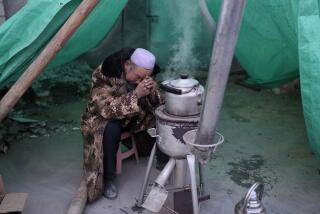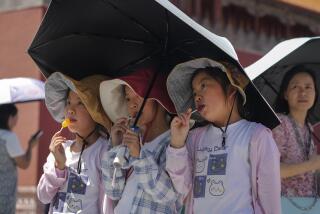Their pre-winter of discontent
BEIJING — Today is Li Xiulan’s favorite day of the year -- it’s even better than her birthday.
It’s the day they turn the heat on.
Winter weather has already arrived here, with temperatures dropping into the high 30s on some nights. But Li’s home in the 500-unit Flower Garden Apartments in a northern suburb of the capital has provided scant refuge from the growing chill.
Instead, Li and an estimated 200 million of China’s poor have been forced to shiver as they mark off the days until Nov. 15 arrives. That’s when municipal managers switch on boilers, radiators and immersion heaters, firing up central heating systems that are a throwback to the Communist-planned economy of the 1960s.
Her red woolen hat pulled low over her ears, Li and her elderly neighbors stamp their feet and do stretches to keep warm in the lot outside her apartment unit.
“Even the outside is warmer than our apartments,” the 67-year-old Li said Wednesday. “Out here, at least we are all cold together.”
In today’s free-market China, many homeowners can flip a switch to heat their homes and offices. Others rent in buildings, such as hotels and foreign compounds, that have their own natural-gas heating systems. Central government officials, as well as military personnel and their dependents, also get heat much earlier.
That cozy accommodation does not extend to the Flower Garden Apartments, a community without thermostats. The complex was built a decade ago to house 500 farm families after their hutong, or ancient alley community, was demolished to make way for upscale apartment buildings.
The damp days and nights make Li and her 78-year-old husband, Delu Wang, pine for the old days in the countryside when they stoked their coal-fueled fire.
“The fire burned all night long -- even if it was a little smoky,” Li said, her hands gnarled and red. “But now no matter how cold it gets, we have to wait for Nov. 15. I think it’s become my favorite day of the year. Even more than my birthday.”
Without heat, the couple wear several layers of clothes, even to bed. The couch inside their tiny concrete-floored apartment is piled with blankets and down-filled coats.
Wang said they get underneath together and snuggle as they watch the televised news reports each night, hoping for a sign that officials will somehow deign to switch the heat on early this year -- an event that, though not unprecedented, rarely happens.
Some residents can afford electric space heaters as a stand-in. The rest congregate most evenings in courtyards throughout Flower Garden, relying on small talk and wry jokes to take their minds off the chill.
They look longingly at the adjacent gated community, home to wealthy Chinese and foreigners, where the heat is already blasting.
“I worry about the newborn babies,” said resident Zhi Wang, a 44-year-old maid. “This complex has many mothers who gave birth just a few weeks ago. And they have to bring their babies home to these refrigerators.”
Beijing’s ranks of the unheated include some foreigners. Ronny Vuechner, a 29-year-old intern with a German government agency here, lives in a building that relies on central heating.
“Every day I rush into the shower, have a hot cup of coffee and get out of my apartment as fast as I can,” he said. Often, he stays late at the office, not for any work but because there’s heat there.
“I have a space heater in my unit, and I sit close to it, but it’s not enough,” he said. “I got a cold three or four weeks ago and it hasn’t gone away. I’m really waiting for Nov. 15. I’m not used to this.”
Officials say the time frame for switching on China’s central heating system is based on an old Soviet system used throughout the communist world, which provided heat at the onset of winter -- defined as the date temperatures dipped below 41 degrees.
In northern areas such as Inner Mongolia and those on the Russian border, where even October temperatures can drop below freezing level, heat is provided earlier than in Beijing, which has used the Nov. 15 start-up date for more than three decades. Residents in southern cities such as Shanghai don’t have central heating. For those who do get it, in most regions the heat runs until March 15.
But even after the heat is turned on, winter in Beijing remains a season to be endured. The central heating often breaks down or spews forth a paltry comfort. And the system shut downs at midnight.
Recent years have seen calls for a heating system reform. Some officials say central heating is an expensive and inefficient waste of energy that takes a heavy toll on the environment. In a country that has become the world’s second-largest power consumer after the United States, Beijing alone will spend an estimated $300 million to provide heat.
Many prefer turning over the nation’s heating systems to more efficient commercial vendors, which will charge for their services.
Flower Garden resident Li Chen would be glad to pay if it meant getting her heat earlier.
“China is supposed to be modernizing,” the 60-year-old said as she held her 7-month-old granddaughter, whose nose was running. “Why can’t we have the right to warm ourselves, like everyone else?”
Li Xiulan and her husband decided it was time to go inside, and they trudged off toward their icy apartment.
“In China,” Li said, “it’s hard to get old. Especially in winter.”
--
Julie Zhang of The Times’ Beijing Bureau contributed to this report.
More to Read
Sign up for Essential California
The most important California stories and recommendations in your inbox every morning.
You may occasionally receive promotional content from the Los Angeles Times.











